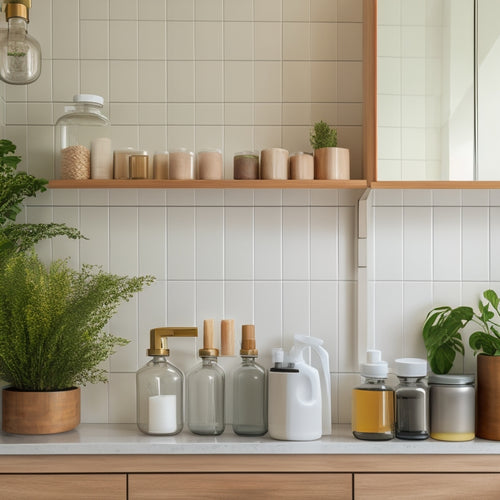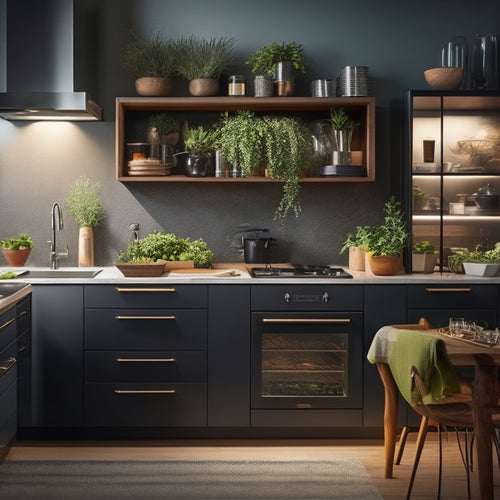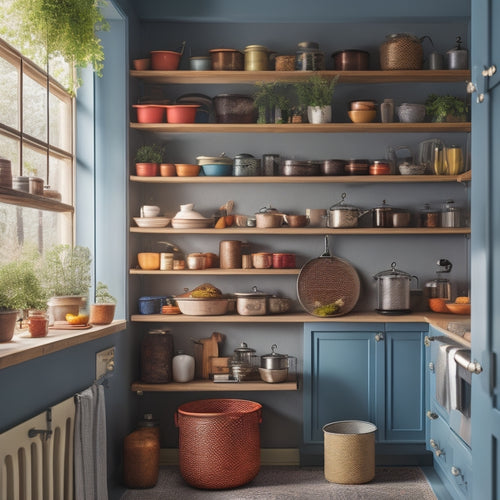
Efficient Kitchen Organization Unveiled: Simplify Your Space
Share
I've created a kitchen that functions like a well-oiled machine, where every item has its designated spot and workflow is streamlined, resulting in more free time and reduced stress. By evaluating my space needs, I identified areas for improvement and planned a strategic layout that prioritizes frequently used items. I maximized vertical storage and designed for long-term convenience, ensuring my kitchen adapts to my evolving needs. To maintain this clutter-free haven, I've incorporated daily habits and practical tips. Now, I'm excited to share the strategies that have transformed my kitchen into a haven of efficiency - and you're about to discover them too.
Key Takeaways
• Assess kitchen space dimensions, layout, and fixtures to identify areas for improvement and optimize storage solutions.
• Strategically place essential items for streamlined workflow, prioritizing frequently used items within easy reach.
• Maximize vertical storage space with shelves, baskets, and hooks to reduce clutter and free up floor space.
• Design a flexible kitchen layout that adapts to evolving needs and incorporates sustainable organization practices.
• Maintain a clutter-free kitchen by consistently tidying, implementing practical tips, and assigning a home for each item.
Assessing Kitchen Space Needs
To efficiently organize my kitchen, I start by taking stock of my available space, considering the room's dimensions, layout, and existing fixtures to identify areas that need improvement. This pivotal step helps me optimize my space, ensuring I make the most of every corner.
I take note of the 'dead' spaces, such as the area above my cabinets or the gap between my countertops and appliances. By doing so, I can plan my organization strategy effectively, deciding which storage solutions to use and where to place them.
This thoughtful approach to organization planning allows me to create a functional and efficient kitchen that meets my needs.
Strategic Placement for Efficiency
By mapping out the logical arrangement of essential items, I can create a workflow that streamlines my cooking and food preparation processes. This strategic positioning allows me to prioritize frequently used items, placing them within easy reach.
I group similar items together, such as baking supplies or cooking utensils, to create a functional organization that saves time and reduces clutter. By assigning a designated spot for each item, I can maintain a sense of order and flow in my kitchen.
This logical arrangement also guarantees that I can quickly locate what I need, minimizing frustration and stress. With a well-planned layout, I can focus on cooking and enjoying quality time with family and friends.
Maximizing Vertical Storage Space
With my kitchen's floor and countertops optimized, I'm now turning my attention to the often-underutilized vertical space, where I can enhance storage capacity and keep frequently needed items within easy reach.
I'm exploring creative shelf solutions and space saving tips to maximize this area. By utilizing cabinet heights and smart storage solutions, I can create a seamless flow between storage and accessibility.
I'm considering installing adjustable shelves, baskets, and hooks to optimize the vertical space, making it easy to retrieve items without straining or climbing. This won't only free up floor space but also reduce clutter, making my kitchen a safer and more efficient haven.
Designing for Long-Term Convenience
My goal in designing for long-term convenience is to create a kitchen layout that adapts to my evolving needs and preferences, ensuring that every item has a designated place and is easily accessible. This means incorporating sustainable organization practices and effective kitchen layouts that prioritize functionality.
To achieve this, I focus on three key areas:
- Implementing time-saving organization solutions that simplify daily tasks
- Allocating space for frequently used items, making them easily accessible
- Designing a flexible layout that can be adjusted as my needs change
Maintaining a Clutter-Free Kitchen
Three months into my newly organized kitchen, I've noticed that maintaining a clutter-free space requires consistent effort and intentional habits to prevent clutter from building up again.
To achieve this, I prioritize decluttering essentials like daily tidying and regular deep cleaning. Effective strategies include assigning a home for each item, using organizing solutions like baskets and bins, and implementing practical tips like the 'one in, one out' rule.
By incorporating these habits into my daily routine, I've found that maintaining my kitchen's organization is much easier. It's all about creating systems that work for me and making them a part of my daily life.
With these habits in place, I can enjoy the benefits of a clutter-free kitchen, including reduced stress and increased productivity.
Frequently Asked Questions
How Can I Create a Functional Kitchen Layout on a Tight Budget?
To create a functional kitchen layout on a tight budget, I'll start by repurposing items, like turning an old dresser into a DIY kitchen island, and then explore affordable custom cabinet solutions to maximize storage and efficiency.
Can I Repurpose Old Furniture for Kitchen Organization and Storage?
"One person's trash is another's treasure" rings true when repurposing old furniture for kitchen organization and storage. I breathe new life into vintage pieces using furniture hacks and upcycling solutions, creating functional and eco-friendly storage spaces that are both stylish and safe.
What Are Some Space-Saving Ideas for Small Kitchen Appliances?
When it comes to small kitchen appliances, I opt for hidden storage solutions like under-sink compartments and vertical solutions like wall-mounted shelves or foldable racks to maximize space and maintain a clutter-free kitchen.
How Can I Keep My Kitchen Countertops Clear of Clutter Permanently?
Like a master chef, I've cracked the code to keeping my kitchen countertops clear of clutter permanently - by implementing decluttering tips, embracing minimalist design, and utilizing clever organizational hacks that create a serene and safe cooking haven.
Are There Any Eco-Friendly Kitchen Organization Products Available?
As I explore eco-friendly kitchen organization options, I'm excited to find sustainable solutions like biodegradable alternatives, zero-waste options, and products made from environmentally friendly materials that align with my values and promote a safe, clutter-free kitchen.
Related Posts
-

Under-Sink Storage Tips for Minimalist Kitchens
To maximize under-sink storage in your minimalist kitchen, start by utilizing vertical space with shelf risers and st...
-

Smart Kitchen Countertop Storage Innovations
Smart kitchen countertop storage innovations are transformative for maximizing your kitchen's potential. You can clea...
-

Best Vertical Storage Solutions for Small Kitchens
In a small kitchen, vertical storage solutions are your secret weapon to maximize every inch of space and keep your c...


